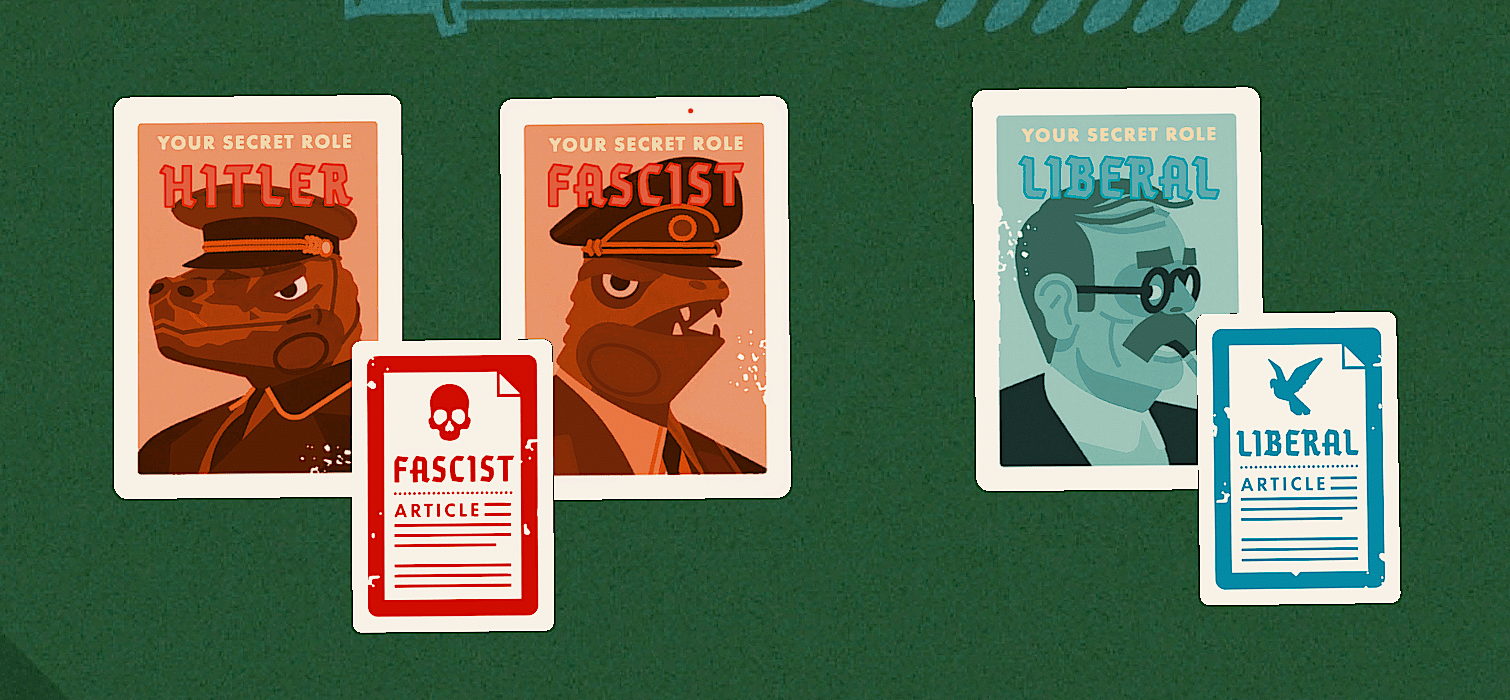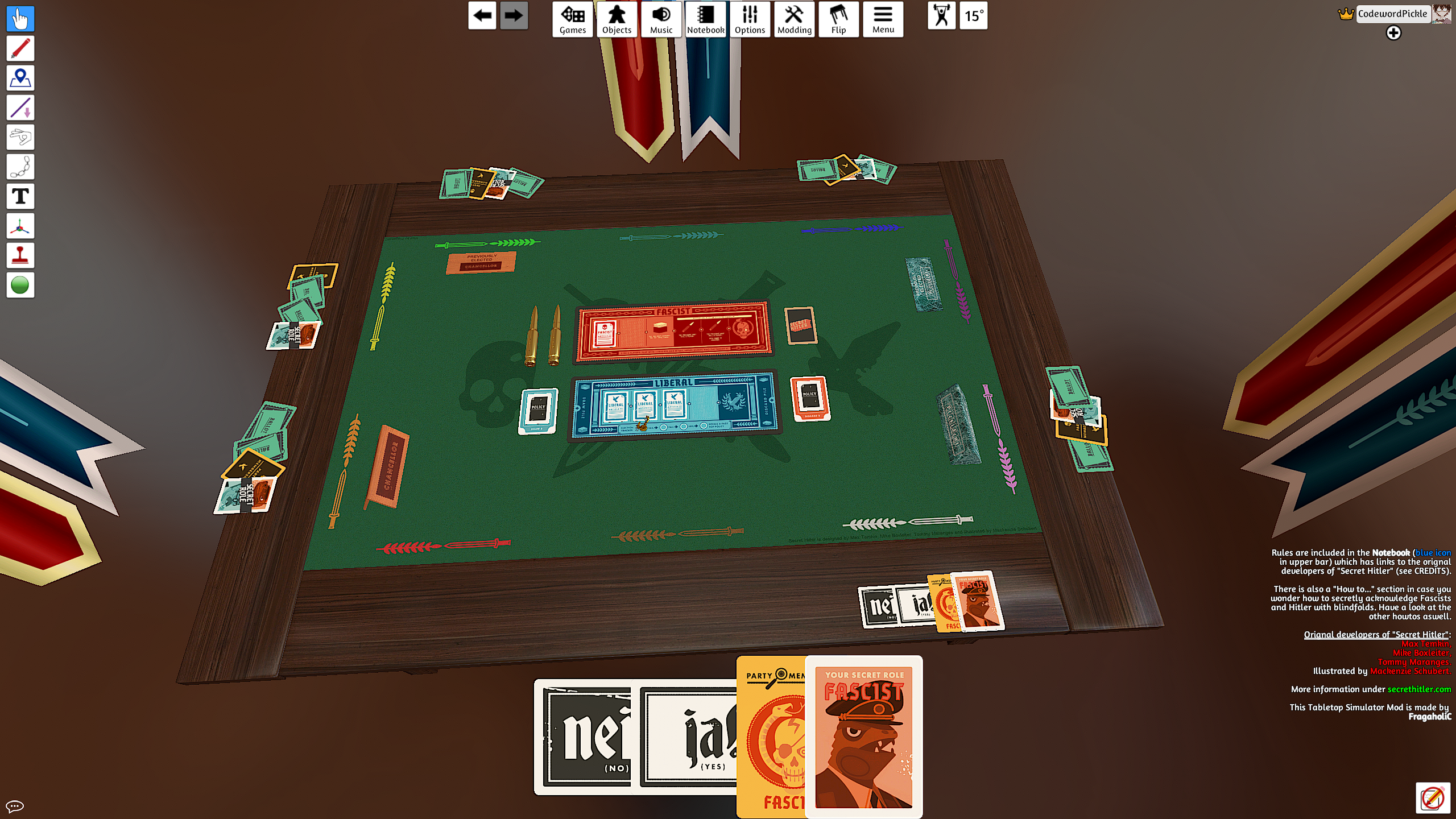Name of Game: Secret Hitler
Creator: Max Temkin
Platform: PC via Tabletop Simulator
Target Audience:
Secret Hitler doesn’t advertise a specific target audience in itself. However, I believe that the game would be best suited for groups of older teens or adults because the rules of the game might be too complex for children. While the game could be played between a group of strangers, it would likely be more fun when played between friends because friends are familiar enough to pick up on the nuances in each other’s behavior which helps make social deduction games fun!
Notable elements of the game: how many players? What actions can players take? How do rounds work? Do they do anything interesting with player relationships/objectives/resources? (refer to Formal Elements for this!)
Secret Hitler can be played in groups of 5-10 players. The players are randomly divided into two teams: fascists and liberals. The ratio of liberals to fascists in each game depends on the number of players, but there are always more liberals than fascists. For example in a group of six players, there will be four liberals and two fascists. The team that a player belongs to is (generally) kept hidden from the other players until the end of the game.

One player on the fascist team is given the special role of “Hitler”. This is who the liberal team wants to discover/kill and who the fascists want to protect/assist. Hitler does not know who the other fascists are, but the other fascists know who Hitler is. In each round, there are the temporary roles of “President” and “Counselor”. The president is chosen arbitrarily at the start of the game and then moves clockwise around the table. The counselor is nominated by the current president and voted on by all the players. The objective of the game for the liberals is to pass five liberal policies or kill Hitler. The objective of the game for the fascists is to pass six fascist policies or elect Hitler as chancellor after at least three fascist policies have been enacted. Players will want to outwit the other team while racing to enact their team’s policies.
After setting up, the flow of a round follows this pattern:
- The presidency is passed clockwise
- The president nominates a chancellor and the other players vote
- If the vote fails, the presidency is passed clockwise again, and the election tracker moves up a place. If three votes fail in a row, the top policy in the deck is enacted.
- If the vote passes and three or more fascist policies have been enacted already, the players must ask the chancellor if they are Hitler. If the chancellor is Hitler, the fascists win the game.
- The President picks the top three policy cards from the deck, discards one, and passes the other two to the chancellor.
- The chancellor discards one of the policy cards and enacts the other.
- If the policy enacted is a fascist card, there may be a special action that the president can take before the round ends. For example, the president may be able to “execute” a single player, removing them from the game.

Secret Hitler is comparable to other social deduction games like Among Us or Mafia. There is a team of players working to discover/eliminate a key bad actor, and the fun of the game comes from the social interactions between players (fellowship). A distinction between Secret Hitler and other social deduction games is that, rather than there being a single bad actor causing chaos, there are few players who are supporters of the bad actor. This shifts the game from a unilateral competition to a team competition.
While Secret Hitler is a team competition, I find it interesting that the game feels very different to play depending on the role you play. For liberal players, they don’t know who is on their team, and the lack of trust in anyone can make the game feel like a multilateral competition. The player that is Hitler also doesn’t know who is on their team; however unlike the liberals, they feel as though they must keep their identity hidden from everyone if they want to stay in the game, making it still feel like a unilateral competition.

Critical Play
I played two games of Secret Hitler with a group of five very close friends. In one round, I was a fascist (not Hitler). In another round, I was a liberal. I found my experience as a liberal to be slightly more fun than my experience as a fascist, perhaps due to my poor abilities to lie/bluff. It was very fun to try to recognize the suspicious behavior patterns of my friends when they were making their case for why they weren’t Hitler or a fascist. This reaffirmed to me that Secret Hitler is a game of fellowship!
I came across a particular epic fail moment when I was playing as a fascist. In an early round, I had been a chancellor that passed a fascist policy. While this aligns with my objective, I had been given two fascist cards from the president, so my actual role in the game was arbitrary to the decision. While I explained this to my friends after the policy was played, I was immediately made a suspicious party. From then on, no one wanted to pick me to be their chancellor when they were president and would vote against my presidency. In this setup, my only support would be Hitler, but that player doesn’t even know that I am a fascist. Even if they did, it would be highly suspicious of them to defend me. The main point I want to make is that it is very difficult to pass any fascist policies if you want to continue to participate in the game. In a small group, it is easy for other players to deny you any power in policy decisions. This felt unbalanced from the fascist POV because the main way to win is by passing policies. I wasn’t able to collaborate with my fascist party as openly as the liberals, we were outnumbered, I was denied legislative power, and we needed to pass more policy cards than the liberals. It feels as through there are too many obstacles for fascists in small playing groups.
There are a few changes that I would like to try when playing Secret Hitler again. I would make the ratio of liberals to fascist more even (1:1) in groups below 8 players. By doing so, it is harder to keep fascists out of the legislative process without knowing exactly who the liberals are or without failing the vote on a dangerous number of presidencies. Alternatively, it would be fun to change the way a failed presidency vote works. Players should be able to block a president’s choice of chancellor (because this is the only way to prevent Hitler from winning after three fascist policies have been enacted), but it would be interesting if players could not block someone from being president. This is a way to artificially force a fascist player into the legislative process and prevent imbalances of power from hard-blocking the fascist party.


